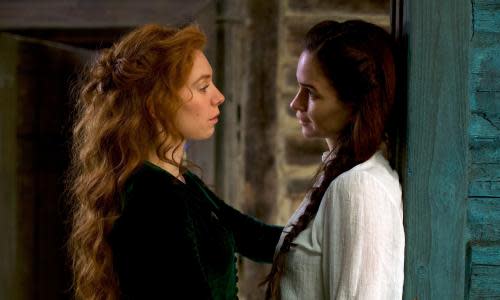The World to Come review – desire runs deep in slow-burn frontier romance

“I have become my grief.” So writes Abigail (Katherine Waterston) in the journal that was intended as a ledger for the quotidian details of 1850s US frontier farm life, but turns into a poetic account of her inner turmoil – Emily Dickinson-infused moments of anguish as she stoically chisels ice from the potatoes for lunch. Then one day a wagon rolls past bearing the new tenants to the neighbouring smallholding. The husband barely registers, but the wife, Tallie (Vanessa Kirby), is magnetic: tawny curls, curious eyes seeking out Abigail’s and holding them in a moment of tingling intimacy. Love at first sight is a frivolity not afforded to women who are chosen by their husbands for their “good sense, efficient habits and handy ways”. Still, there’s something between them, something that Abigail, for all her eloquence, can’t quite find a way to name.
Taking its cue from Tallie’s honeyed colouring, the film – the second feature from the Norwegian director Mona Fastvold – subtly warms once Tallie arrives. Abigail’s farm – a glum, blocky building so dark and featureless that it seems to be an absence, a hole in the snow, rather than a presence – takes on the comforts of a home. The connection between Tallie and Abigail is born out of confidences shared about marriages in which “wifely duties” are just an onerous addition to a list of chores that also includes darning, milking cows and shovelling chicken droppings. But it blossoms into something richer.
This is a singularly subdued kind of storytelling. Passions run deep, but there’s a reticence in the film-making that makes them feel like a whispered secret in a church pew rather than a grand, soul-baring declaration. As such, Fastvold’s film won’t be for everyone: it’s closer in tone to the gentle, slow-burning intimacy of First Cow than to the savage sadness of Brokeback Mountain. But there’s a satisfying literary intelligence at work. Co-writers Jim Shepard and Ron Hansen are both novelists, and The World to Come reflects that in its absorbing emotional layers and tender reverence for the written word.

 Yahoo Movies
Yahoo Movies 